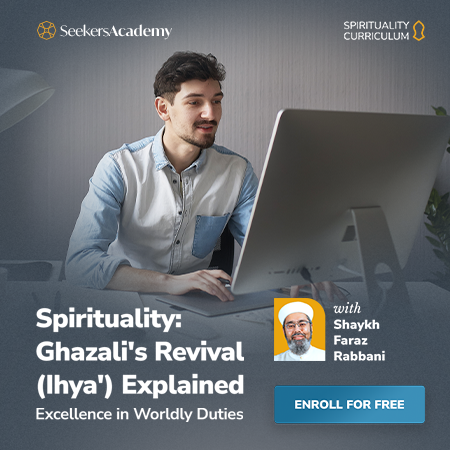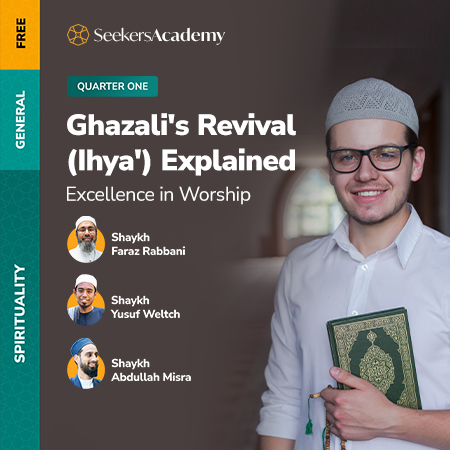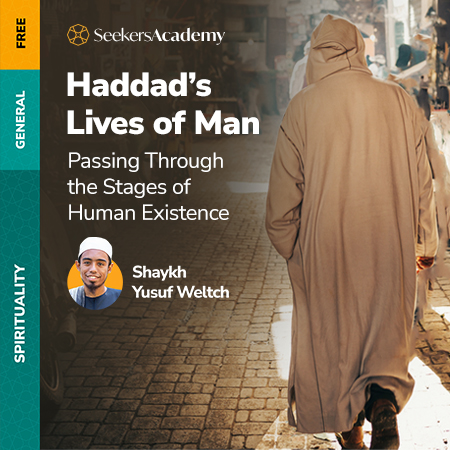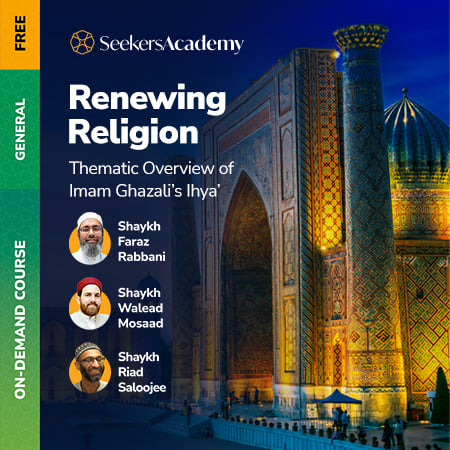
How does one revive one’s religion and relationship with Allah Most High? In this critical class, Shaykh Faraz Rabbani and Shaykh Abdullah Misra summarize the teachings of Imam Ghazali’s masterpiece of Islamic knowledge and spiritual guidance, Revival of the Religious Sciences (Ihya’ ‘Ulum al-Din).
This text is split into four quarters. Quarter Two of the Ihya’ focuses on the worldly and social duties we have, such as the proprieties of eating and drinking, marriage, earning a living, brotherhood and companionship, social relations, proprieties of seclusion - and other responsibilities.
The human is a social animal - not just an animal. This is a responsibility and trust; and an opportunity of seeking Allah Most High in our worldly living and social duties.
How do we develop God-consciousness in these social duties? It is through acting with dignified restraint in our daily lives. If we can have dignified restraint in regards to things around us that may not be impermissible (haram), then it will be easier to have restraint with things that are impermissible.
This is achieved through making our actions, actions that (1) uphold the limits of Allah Most High; with (2) outward excellence through following the sunna of the Prophet (peace be upon him); and with (3) inward excellence through sincerity and presence of heart.
By applying the lessons learned in this course, students will be able to develop restraint and gratitude in their daily activities, such as how they conduct themselves in their marriage or business dealings.
This class presents the key aspects of Imam Ghazali’s teachings with clarity and context. It allows people of all ages to benefit from a magnificent work of spirituality, and from practical teachings that relate to us in our day-to-day lives.
Essentially, through this course, the student will learn how to bring Prophetic guidance to life, practically and deeply.
- Teacher: Shaykh Faraz Rabbani
The masterpiece of Imam Abu Hamid al-Ghazali, Ihya’ ‘Ulum al-Din, consists of forty Books organized into four Quarters. In this course, Quarter Two of the Ihya’ on Excellence in Worldly Duties (Books 11 - 20), will be covered.
Imam Ghazali’s work is focused on teachings relevant to every stage of our lives. Said to be the greatest scholarly work from the writings of the scholars, the Ihya’ teaches the importance of cultivating spirituality through the Sacred Law - making it the practical tool all believers can benefit from.
The Ihya’ is about bringing religion into the lives of everyone who studies it. Religion is guidance, and guidance is beneficial knowledge. Imam Ghazali introduces all key concepts that are important to our lives and the afterlife–those things that have to be cultivated, rooted out of our hearts, and upheld at all times. This is why Imam Ghazali’s method of spirituality is often referred to as “practical spirituality.”
- This course is for adults, and for youth seeking to deepen their understanding of Islam.
- It is particularly beneficial for anyone seeking to connect Islamic knowledge to beneficial action, rectifying one’s relationship with Allah, and acquiring sincerity and presence with Allah.
- It is a general enrichment course that anyone can benefit from.
- This course can also be taken by anyone who is interested in practical spirituality
- Apply the etiquette of eating
- Strive to fulfill forgotten sunnas of eating with others
- Understand how to fulfill excellence in your marriage
- Learn how to conduct yourself in business
- Develop mindfulness of Prophetic etiquette in the presence of your friends and family
- Learn how and when to command the good and forbid the evil


